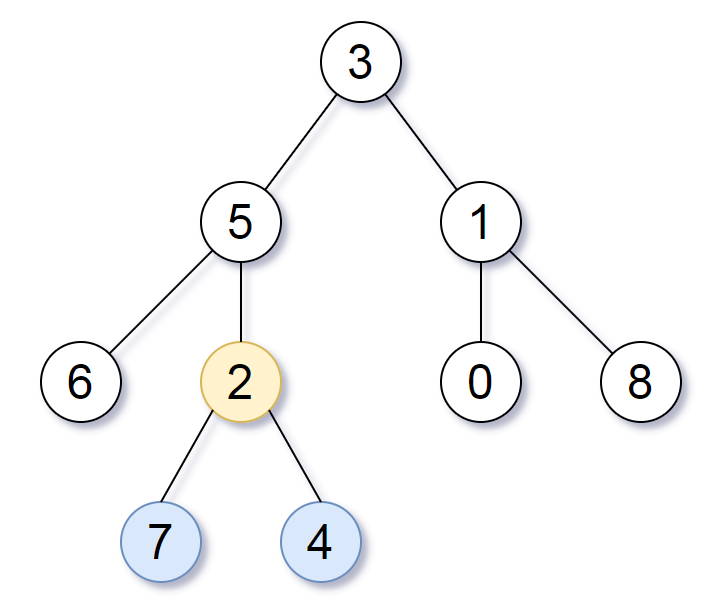LeetCode in Kotlin
865. Smallest Subtree with all the Deepest Nodes
Medium
Given the root of a binary tree, the depth of each node is the shortest distance to the root.
Return the smallest subtree such that it contains all the deepest nodes in the original tree.
A node is called the deepest if it has the largest depth possible among any node in the entire tree.
The subtree of a node is a tree consisting of that node, plus the set of all descendants of that node.
Example 1:

Input: root = [3,5,1,6,2,0,8,null,null,7,4]
Output: [2,7,4]
Explanation:
We return the node with value 2, colored in yellow in the diagram.
The nodes coloured in blue are the deepest nodes of the tree.
Notice that nodes 5, 3 and 2 contain the deepest nodes in the tree but node 2 is the smallest subtree among them, so we return it.
Example 2:
Input: root = [1]
Output: [1]
Explanation: The root is the deepest node in the tree.
Example 3:
Input: root = [0,1,3,null,2]
Output: [2]
Explanation: The deepest node in the tree is 2, the valid subtrees are the subtrees of nodes 2, 1 and 0 but the subtree of node 2 is the smallest.
Constraints:
- The number of nodes in the tree will be in the range
[1, 500]. 0 <= Node.val <= 500- The values of the nodes in the tree are unique.
Note: This question is the same as 1123: https://leetcode.com/problems/lowest-common-ancestor-of-deepest-leaves/
Solution
import com_github_leetcode.TreeNode
/*
* Example:
* var ti = TreeNode(5)
* var v = ti.`val`
* Definition for a binary tree node.
* class TreeNode(var `val`: Int) {
* var left: TreeNode? = null
* var right: TreeNode? = null
* }
*/
class Solution {
private var deepLevel = 0
private var left: TreeNode? = null
private var right: TreeNode? = null
fun subtreeWithAllDeepest(root: TreeNode?): TreeNode? {
if (root == null || root.left == null && root.right == null) {
return root
}
deep(root, 0)
return if (right == null) {
left
} else {
lca(root, left!!.`val`, right!!.`val`)
}
}
private fun lca(root: TreeNode?, left: Int, right: Int): TreeNode? {
if (root == null) {
return null
}
if (root.`val` == left || root.`val` == right) {
return root
}
val leftLca: TreeNode? = lca(root.left, left, right)
val rightLca: TreeNode? = lca(root.right, left, right)
return if (leftLca != null && rightLca != null) {
root
} else {
leftLca ?: rightLca
}
}
private fun deep(root: TreeNode?, level: Int) {
if (root == null) {
return
}
if (deepLevel < level) {
deepLevel = level
left = root
right = null
} else if (deepLevel == level) {
right = root
}
deep(root.left, level + 1)
deep(root.right, level + 1)
}
}

